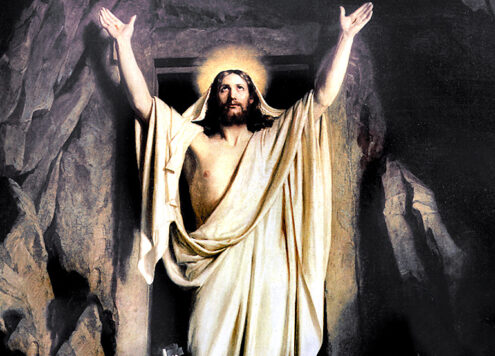Lent is upon us, a liturgical season cloaked in purple, reminding us of Christ’s Passion. This season invites us to step into a sacred space of introspection and renewal. It’s not just about giving up chocolate, alcohol, cigarettes or social media. It’s a spring cleaning for the soul, a chance to rediscover the light within that transforms, outwardly, the way we behave.
Imagine Lent as a 40-day workshop led by the greatest teacher, Jesus himself. He lays out three tools in Matthew 6 : 1-18: Prayer, Fasting, and Almsgiving, disciplines that serve as the pillars supporting our quest for renewal. These are pathways to deepening our communion with the divine and with one another. Reflect on what Jesus says about these three practices.
On Prayer: “Go to your inner room, and pray to your Father in secret.”
On Almsgiving: “Do not let let your left hand know what your right is doing, so that your almsgiving may be in secret.”
On Fasting: “When you fast, anoint your head and wash your face, so that you may not appear to be fasting, except to your Heavenly Father who is hidden.”
We need to ponder first what we are being renewed for. The answer lies in the resounding message of Easter: to become more like Christ. He, who walked through the valley of darkness and death, emerged radiant and alive, and calls upon us to follow in his footsteps. The goal of Lent is to become more Christ-like .
Lent is not only about fasting from external things as I’ve mentioned. It is about fasting from intrinsic things like anger, bitterness, jealousy, harassment, harsh judgment, pride; and it’s about replacing these vices with their opposites: love, cooperation, joy, compassion, meekness, humility. A good Lenten practice would be to meditate on the Beatitudes of Jesus (Matthew 5 : 1–12), those interior attitudes that backtrack to the true condition of the human heart. The beatitudes call on us to shed the layers of our being that distance us from God and our better selves, encouraging a transformation, both inward and outward. This kind of conversion is never static; it is ongoing because of our fallen nature.
Think of Lent like training for a marathon, not of the body, but of the soul. We must be transformed from within by giving up defeatist thoughts, nasty words and evil deeds, and replacing them with positive thoughts, compassionate words and generous deeds. Think of this whenever you ask for forgiveness “in thought, word, and deed” at the beginning of mass. This spiritual decluttering touches every fiber of our being: For example, the worrywart can replace anxious thoughts with trusting prayer. The stressful soul can find solace in silence and meditation, letting the noise fade away and connecting with the stillness within. The bitter heart can heal, choosing forgiveness over resentment. The judgmental mind can embrace empathy, stepping into another’s shoes and understanding another’s journey before casting stones. The grudge-holder can let go of what weighs him/her down, choosing reconciliation over the poisonous grip of the past.
Renewal, however, is not a one-time event. Lent serves as a reminder that our journey towards renewal is continuous and ever-evolving. Indeed, it’s a lifelong journey, fueled by the continuous process of conversion. St. John Henry Newman reminds us that change, sometimes uncomfortable, is necessary to blossom into our best selves. We shed old habits, embrace the good, and inch closer to Christ. Lent challenges us to confront our resistance to change and to embrace the power of God’s grace. In doing so, we are not only preparing ourselves for the celebration of Easter but also for a life that reflects the example of Christ.
Remember: Lent is not just a season but a state of being, a call for meaningful renewal, where we commit to a path of positive change, deepening our faith and enriching our spiritual journey. It’s an opportunity to embrace the transformative journey of becoming more Christ-like, not just for forty days, but for life. May this Lent be a stepping stone on your path to becoming more like Christ; one kind word, one act of compassion, one moment of quiet reflection at a time.
—Fr. Hugh Duffy











3 Comments
Bartholomew Okere
Fr. Duffy, a well articulated Lenten journey catechesis.
You made it categorically clear that Lent is a period of renewal, fasting & temptation. A season that goes with the Beatitudes & repentance Jesus echoes in Mk’s gospel, this is the time of fulfillment, the k/dom of God is at hand; Repent & believe in the gospel (Mk1:15) Thanx for your reminder & exegesis.
Tom Walsh
Thank you Fr. Hugh for this comprehensive reflection on Lent. It is very much appreciated helpful and insightful for me. What stands out most for me is your focus on becoming Christ like. This alone is powerful in my eyes and if I can keep it to the fore of my mind for Lent, I believe it will bring about Serenity in my heart for my benefit and all that I meet on a daily basis. Thank you once again
Tom Rooney
Thank you for all that you do amen 🙏